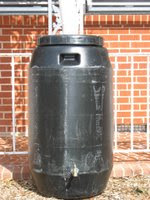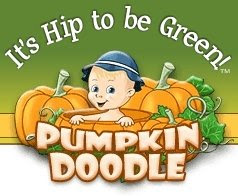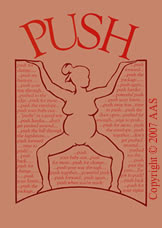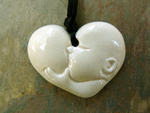Hey! Meteyer is a physician ...
Read the full article at Outside the Hospital: Local women discover natural birth
" ... epic 48-hour labor without drugs." As genuinely impressed as I am with the article and with Dr. Meteyer's awareness and commitment to natural birth, including her own, I have to post an article I wrote last week. It is about the baby's experience of birth, the baby's perception of his or her experience of birth.
One of my major complaints about both of the fields of obstetrics and midwifery is that few of the highly trained people in either profession consider the impact of the birth on the baby. Whether the birth is at the hospital, birth center, or home, I found the caregivers are oblivious to the baby. The single, desired outcome is, "Live baby." Their focus seems to be on showing that the birth choice and process was just fine, because, "the baby is ok." Baby is alive, baby is ok, and baby looks good, that is the language, regardless of what happens. No one asks the baby, or considers the baby ... as the general belief is that babies are resilient, and babies don't remember; so, adults trained in the medical field, wearing scrubs, licensed by states, and insured can do whatever they want or need.
I wrote the article after several days after learning from my friend/colleague who is writing a book on the experience of Csection and VBAC birth. She said out of two hundred stories, none, not one of the women talked about how the birth impacted their baby. I had been chatting over a period of days with David and Donna Chamberlain about this phenomenon. David is a pioneer in the field of prenatal consciousness. I contend that doctors, nurses, men, and women ... they can't allow themselves to consider that the human baby is fully aware and recording everything. To do so means they have to acknowledge what they've been doing to babies, sometimes for years and years. Mothers and fathers can't acknowledge the traumatic aspects of their baby's birth because our mainstream culture doesn't yet accept the science and techniques to heal the experience. Major abdominal surgery which prevents the baby from experiencing what humans have experienced for eons is touted as perfectly safe for the baby.
I have also been editing a documentary-style piece for the Columbia, MO Red Tent Event (www.birthonlaborday.com). Six of the seven women who shared their stories gave birth by cesarean section. I was so surprised; I expected it would be a lot of "natural birthers and homebirth mothers bragging about their experience to make other women feel bad," as another blog about homebirth rags about. Five of the 6 women also did a VBAC. They shared the traumatic experience of surgical birth and the triumph of completing themselves, healing themselves after a vaginal birth. During neither the surgical birth or the vaginal birth story did women talk about the impact of the experience on their baby. Women rarely do .....
So, here's my draft of an article I started for the www.BEPE.info group:
In our culture we speak of a baby’s birth as if it were the mother’s birth. When mothers give birth to their babies they are aware of their own experience and love to share it with everyone. But, do we consider the baby’s experience? Do we consider that as the mother speaks of her experience – joyful or painful – that the baby also has a perspective? His or her own story? Whether we acknowledge it consciously or not, we mothers naturally and intuitively know on a deep level that their baby also experienced their birth. We have never had the acknowledgement or support to truly “go there” in order to consider that that birth that profoundly affected us negatively also affected our baby.
When birth has been long, challenging, and painful, it has also been the same for the baby. In fact, it is even more so for the baby. The baby’s physical experience of being stuck, for example, is as terrifying as the mother’s experience, or maybe more. Unfortunately, society hardly acknowledges the life-altering impact of even a great birth. Women are not supported to celebrate the beautiful birth or to process a dangerous or terrifying birth experience.
The baby is also experience the most profound experience of life: the transition from the warm, wet, safe environment to this world. Within seconds or preferably minutes, the baby’s connection to the mother – his cord – is severed. She or he immediately goes through astounding physiological changes to become a totally, separate, and independent person. For almost ten months she or he has been symbiotic with his mother in every way .. physically, emotionally, psychologically, and spiritually, and physically.
The physical change alone is monumental. Within seconds the baby’s heart chamber closes to reroute blood, the liver begins to filter, the lungs expand.
Whatever is going on in the environment will either support or interfere with the baby’s process. This is all recorded in the baby’s brain. From the moment of conception, the creature we now know is our baby, has been growing in reaction to our environmental experiences and reactions. She or he only knew the world through us – our emotions, our hormones, our choices and behaviors. Now, his or her body (and brain) will begin her own life.
This is the moment as well when our new relationship begins with our baby. We have known this baby for months. We have felt our baby stirring within us. We can feel the difference between our baby’s personalities during gestation. We have talked to the baby, told her of our dreams of her and for her future. We have told her we can’t wait to see her. Some mothers have not wanted their babies and their gestational dialogues have gone differently. Whatever the story, it also belongs to the baby. Now our baby is here. She or he is a totally separate human, but it does not feel like that to us. This insures the baby’s survival.
The newborn baby’s life is still completely dependent. She or he is totally helpless and will survive only if there is a loving, nourishing caretaker who will protect him or her from dangers of the world. We humans are resilient and we do manage to survive in the harshest and most violent, uncaring environments, but we now know that a human’s ability to receive and give support, nurturing, and protection to others and self begins in the womb and during labor, birth, and infancy.
As mothers our emotional and psychological beliefs about our baby and our lives are important from conception forward. The baby has been grown in the womb of the person intended to be that caretaker and protector – in most cases. The relationship and the baby’s experience of the parents are well-established by birth. The birth experience will inform baby of how the world is – quiet, safe, supportive or scary, touch is harsh, and cold -- and how we will care for and protect him or her.
Mothers have their perspective of their experience of birthing their baby. Babies have their experience of being born. Did the baby begin his or her own birth process as is physiologically indicated? Or, was she induced? Was epidural narcotics used so that mother’s attention and focus was no longer on her body and her baby? What was that like for the baby?
How mother and baby come back together to reconnect will form a foundation for their way of relating. This is a profound relationship that will undergo major psychological and emotional changes in those first moments of life outside the womb. How mother and baby reconnect is defining. How that re-connecting and integration occurs will be the template for their relationship outside the womb.
Babies tell their story as mother tells her story – and new mother tell their story often. “Then the epidural came on and I was relieved. I watched television and slept. It was great.” But the baby is crying and thrashing. Mother says, “Shh, shh, shh,” to the baby and goes on with her story while simultaneously trying to force a breast or bottle in the baby’s mouth. This is like a mother telling her experience of birthing her baby, “It was horrible. I was in such pain and no one was there to support me.” Her friend says, “Shhhh..shhh…shhh… here is a piece of cake” and it is forced upon her. Soon the mother will not be trying to share her story that needs only to be acknowledged. It’s not that her perspective “will just go away” with time. She learns to hold the emotional pain inside. Babies learn this way too.
A baby’s response will accelerate, for example, when a mother is speaking of a medical caregiver whom she felt was invasive or violating. Or, sometimes, babies appear to zone out or fall asleep. They are “checking out”, they are not asleep. Babies also respond to parts of THEIR story that are joyful, exciting, and supportive. “And, when Bob (daddy) arrived I was able to relax and ….” baby relaxes, coos, laughs, or shrieks.
While I know this information may trigger many feelings about how our babies have been treated and what they experienced, I also always intend to provide the hope to heal it. It is important to understand that there are new techniques that support babies to heal what happened during birth. These techniques support mothers and babies to tell their story and to be heard by one another. Acknowledgement is the foundation for mother-child healing and for family and couple healing. Fathers/partners have their perspective of their experience that varies greatly from either mother or baby. Their experience is vastly different, but just as important. Fathers also need to have support to share their story and to be heard and supported. Men have no place to share, “I felt horrible when I wasn’t able to protect my baby or when I couldn’t get the nursing staff to listen to our decisions” or “when this man I never saw before lifted up my wife’s gown and ….”.
Mothers and fathers – nurses, doctors, anyone – can learn to watch babies and listen to their cries. Adults are too fast. They tend to be invasive of baby’s space and unresponsive to baby’s timing needs. Anyone can learn how to slow down and to respond to a baby in a more gentle, slower, and aware manner. All of us can learn how to pause when we are too activated, and to slow down to hear and see BABY’S story and their current needs expressed through their body language and cries.
This information can be quite alarming for parents who have not considered that their baby has their own perspective of the birth experiencing. This can trigger shame, guilt, anger, and denial. That is the “bad news” as I call it. The GOOD NEWS is that there is much new scientific information and new techniques to support a person – at any age – to heal their very early experiences. The focus of the new techniques works on the central nervous system level. We intend for baby (whether 4 days or forty years old) to have an experience of being wanted, heard, protected, seen, not separated from mother, or touched gently, etc. When the baby has that experience, the nervous system is able to create new neural connections around that experience. It allows one to integrate the undesirable experience with the desirable.
Healing, integration, processing … it is about healing the experiences during conception, gestation, labor and birth, and early parenting in order to overcome the experiences that interfere with attachment and bonding in the primal period. We believe that these early experiences are the foundation for the rest of life. We believe that the GOOD NEWS is that we can create the relationships we wish for with our loved ones when we acknowledge our woundings and the joys of our earliest experiences.
Therapists who work this way – to support baby, mother, and father to process their individual experiences and to integrate them into their new family system -- have been trained in biodynamic craniosacral therapy as the foundation for the work, and will have trained with one of the pioneers of this work, William Emerson, Ray Castellino, Wendy McCarty or one of their many students. Therapists and their teachers are usually members of the International Association for Pre and Perinatal Psychology and Health (APPPAH) (www.birthpsychology.com). APPPAH was co-founded by Nevada City resident, Dr. David Chamberlain. He and his wife Donna started a local group, Birth and Early Parenting Educators (BEPE) to support Very Early Parenting locally and beyond.
L. Janel Martin Miranda
CranioSacral focused Attachment Therapist
Birth Videographer
Midwest BEPE - Columbia, MO








2 comments:
Many of us nurses do think a lot about how the baby feels. We talk to them when they get out. I tell the mother and father to notice the facial expression when the baby comes out. Most babies look at me like "hey lady, did you get the number of that truck that hit me?" And they must have a killer head ache after being squeezed for hours.
I am glad to hear from you ... and, I know that many nurses do think about the baby's experience.
I am not sure about the headache ... supposedly the pressure serves a purpose ...
Do you believe the baby is experiencing birth and that there brain is recording the information? And,that everything you -- or anyone -- says, feels, and does in the presence of a laboring and birthing newborn will be literally absorbed by the baby? Remembered by the baby? Being called "pumpkin", "Oh, my what a big girl you are", and others impact a baby. I am working on a piece of video where the nurse repeatedly rubs the baby's foot and ribs to get him to cry WHILE making goo-goo high pitched perky sounds .... what kind connections are being made during birth when the baby hears only strangers doing their job and saying unconscious things and incongruent things. The rough handling of the baby at birth have to do with high incidence of sensory integration issues and life long parenting concerns?
Thanks for the comment.
Post a Comment